Ensuring Every Child Learns
We work with parents, communities, and schools to ensure every child—especially those from marginalised backgrounds—has the opportunity to enrol, attend, and succeed in school. Our focus is on early identification, consistent follow-up, and community support to make education a shared priority.

School Admission & Awareness Drive
We conduct local campaigns and community outreach to identify out-of-school children and support their entry into government schools. Our dedicated community workers and volunteers are linked to each school in the intervention area, assisting families in navigating the admission process. Where schools create hurdles, we stand with parents to resolve issues and ensure smooth enrolment. Once admitted, we continue to track children’s attendance and progress, addressing risks of dropout at an early stage.
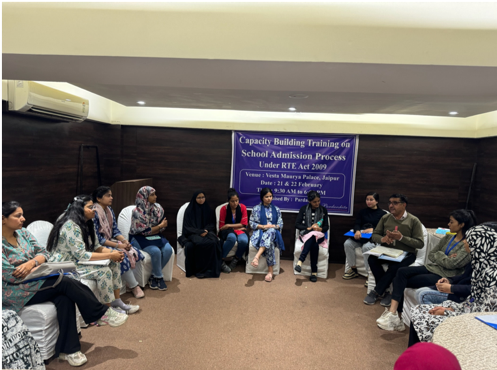
For enrolment in private schools under the RTE Act’s Economically Weaker Section (EWS) quota, we provide specialized support. This includes identifying eligible families, counseling them on their rights, helping them prepare the required documents, and guiding them through the online application process. If a child is selected, we also intervene when private schools attempt to deny or delay admission. Beyond enrolment, our team monitors post-admission to ensure children settle well, continue their education, and receive the entitlements guaranteed under the Act.
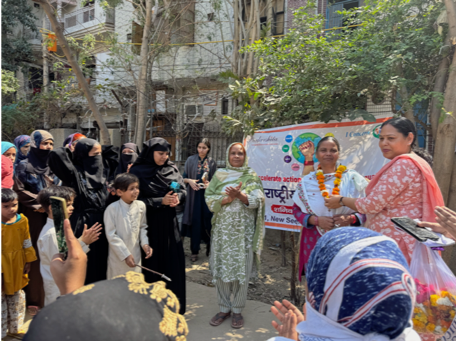
Strengthening School Management Committees (SMCs)
We build the capacities of School Management Committee (SMC) members to enable them to effectively fulfill their
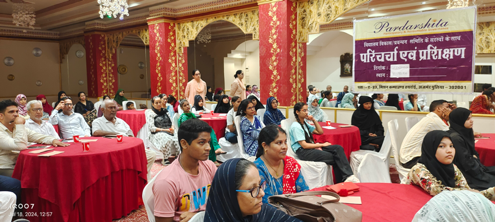
Direct activities with children
We conduct Bal-Balika Sabha both in schools and within communities, creating inclusive platforms where all children from our intervention areas are invited to participate.
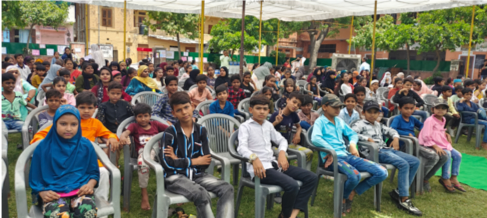
These child-led forums encourage children to express themselves freely and share issues that matter to them—whether it is related to academics, timely access to textbooks, classroom experiences, sports participation, or their own safety and protection. The Sabha nurtures confidence, leadership, and collective problem-solving among children, ensuring that their voices are heard and valued.
To deepen this process, we have facilitated Participatory Rural Appraisal (PRA) exercises with children, their parents, and School Management Committee (SMC) members to map out safety concerns within schools, on the way to school, and in community spaces, with a special focus on challenges faced by girls. Based on these findings, we not only addressed individual cases identified but also designed preventive interventions. We organized awareness and safeguarding sessions in 80 schools in collaboration with District Legal Service Authorities (DLSAs), covering topics such as safe/unsafe touch, personal boundaries, and strategies for self-protection. These efforts have helped create safer and more child-friendly environments in schools and communities.
Remedial Learning Centres
We run dedicated support centres for children who require additional help in building foundational skills such as reading, writing, and mathematics.
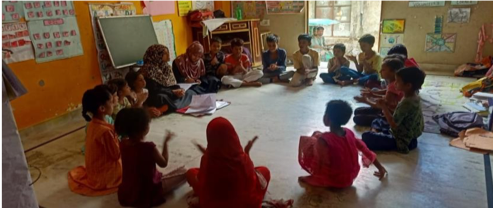
These centres act as safe learning spaces where children can catch up academically and regain confidence, enabling them to stay engaged in school. Our trained facilitators receive continuous capacity building on effective pedagogy, language transition (to support children moving from mother tongue to the medium of instruction), life skills, and the development and use of child-friendly teaching–learning materials (TLMs). With this structured support, we are able to mainstream most children into formal schools and help those already enrolled to cope better with their studies.
These interventions proved especially crucial during and after the COVID-19 pandemic, when prolonged school closures and limited access to online learning left many children far behind in their grade-level competencies. While we provided learning support during the pandemic, our centres have since become a bridge for recovery, ensuring children do not drop out and are better prepared for regular schooling.
Community Safety Net for Children
Pardarshita has established Child Rights Watch Groups (CRWGs) at the community level to act as vigilant bodies for protecting children from exploitation and abuse.

These groups, made up of trained community members, youth, and parents, play a proactive role in identifying cases of child labour, trafficking, child marriage, and sexual abuse, and in ensuring that immediate action is taken. CRWGs work closely with institutional mechanisms such as Childline and Anti-Human Trafficking Units (AHTUs) to report cases, facilitate rescues, and link survivors to essential support services. Through this collaboration, many children have been successfully rescued and provided with legal aid, victim compensation, psychosocial care, and rehabilitation measures, enabling them to rebuild their lives with dignity.
Alongside case response, Pardarshita also focuses on prevention by conducting awareness sessions in schools on issues such as safe and unsafe touch, child rights, and how to report abuse. These sessions engage not only students but also teachers and families, creating a stronger circle of protection. Over time, CRWGs have become a trusted local mechanism, strengthening community accountability for children’s safety and rights.
Empowering Gender
We work to create a society where women and girls feel safe, confident, and heard. Through awareness, legal support, literacy, and youth-led initiatives, Pardarshita helps break down everyday barriers and build gender-inclusive communities.
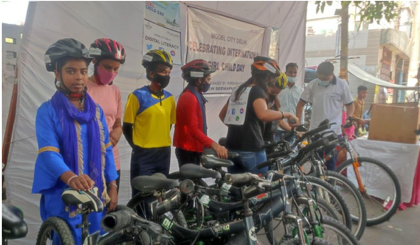
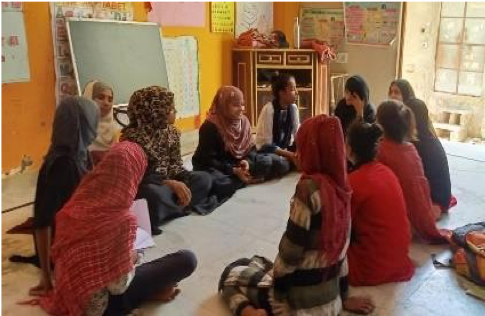
Gender Equality through Sports
Pardarshita uses the power of sports to promote gender equality and child rights. Football, in particular, is a tool to develop leadership, teamwork, and confidence among girls and boys. On the field, children learn to challenge stereotypes, take decisions, and support one another—skills that translate into their academic and personal lives. Alongside football, other activities create safe spaces for dialogue on education, aspirations, and gender roles.
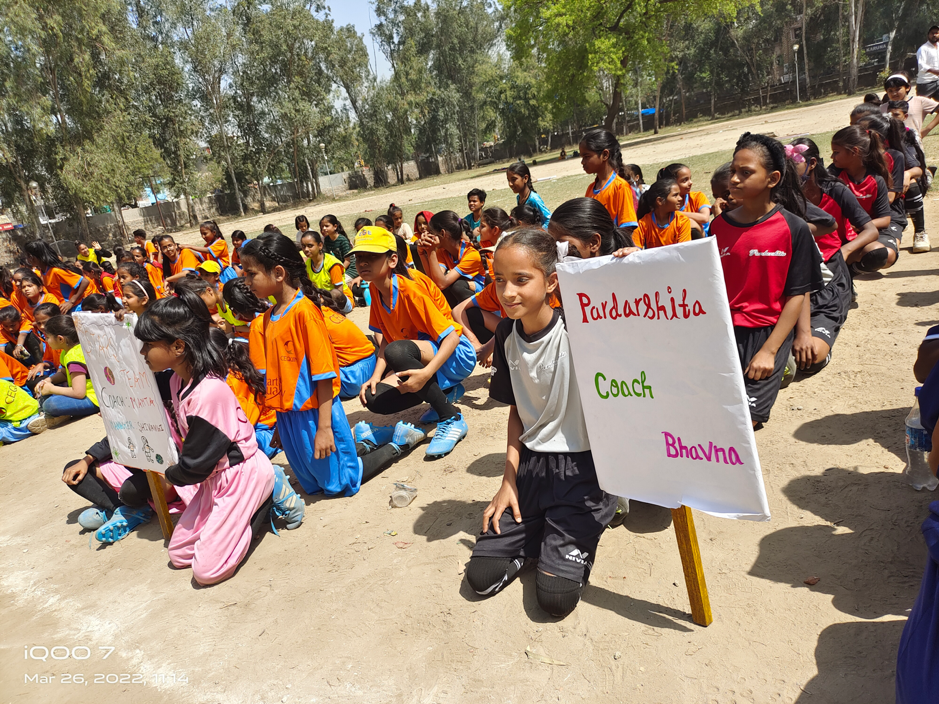
Community events like the Girl Child Cyclothon amplify messages of safety, equal opportunity, and digital literacy, while making girls’ presence visible in public spaces. These initiatives nurture young leaders and inclusive communities.
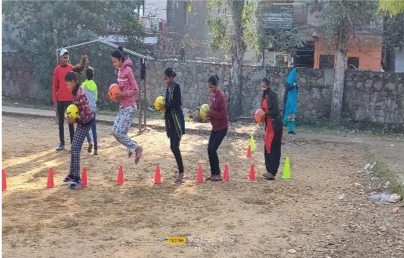
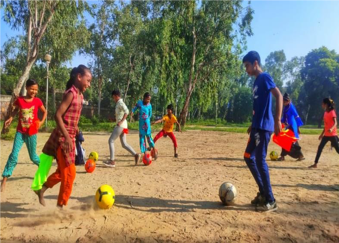
Mahila Panchayat – Local Women Leading Change
Community women are trained as para-legal leaders to respond to domestic violence and help other women access justice. These grassroots collectives support conflict resolution and strengthen women’s leadership.
Support for Survivors of Violence
Our counsellors are placed in police stations to help survivors of domestic and sexual violence. We also provide legal support through our Rape Crisis Cell, guiding survivors from reporting to trial completion.

Women’s Literacy Programme
We offer basic literacy and numeracy classes for adult women who were unable to access formal schooling during their childhood. These classes cover essential skills such as reading, writing, and mathematics, enabling women to handle everyday tasks with greater confidence—whether reading a bus sign, writing an application, or managing household finances. Beyond academics, the programme fosters self-esteem, independence, and a sense of dignity for women who often felt excluded from learning spaces. Many participants use their new skills to better support their children’s education, engage more actively in community affairs, or pursue livelihood opportunities. By creating supportive peer-learning groups, we not only provide education but also build solidarity and collective empowerment among women.
Empowering Youth & Livelihood
Pardarshita empowers youth and women by building skills and linking them to employment, self-employment, and government schemes. Our focus is on fostering confidence, independence, and sustainable livelihoods within communities.
Youth Skill Development for Employability
Pardarshita’s Youth Skill Development initiative aims to enhance the employability of underserved young people by building their foundational and workplace skills. It equips underserved youth with essential skills in computers, English, and personality development to boost their employability. Many participants have been linked with job opportunities in Delhi and Jaipur, Rajasthan with a strong focus on supporting young women.

Youth Resource Centre: A Hub for Learning and Leadership
To support holistic development, Pardarshita has established a Youth Resource Centre in New Seemapuri. This multi-purpose community space offers youth access to a library, cyber café, indoor games, and inspirational media. It also serves as a training and capacity-building hub, equipping youth with the knowledge and confidence to facilitate access to public services and entitlements within their communities.

Climate & Environmental Resilience
Water Resource Management & Conservation
Pardarshita works with communities to promote responsible water use and conservation practices. Through awareness drives, local meetings, and hands-on activities, we encourage families to protect water sources, adopt simple conservation habits, and take collective action to address water scarcity. Our focus is on building a shared sense of responsibility, especially among youth and women, to preserve water for daily needs and future generations.
Afforestation & Urban Greening (School-Based)
Pardarshita promotes tree plantation and green practices in school campuses to instil environmental values among children from an early age. With active participation from students, teachers, and community members, we encourage schools to become greener, cleaner, and more climate-friendly. These efforts not only improve the environment but also nurture a sense of responsibility and care for nature among young learners.

Plastic Waste Reduction & Sustainable Alternatives
Pardarshita works with schools and communities to reduce plastic waste and promote eco-friendly alternatives. Through awareness drives, clean-up campaigns, and interactive sessions, we encourage children and families to avoid single-use plastics and adopt sustainable habits. As part of this effort, we also distribute cloth bags to promote reusable practices and reduce dependency on plastic carry bags—fostering cleaner surroundings and greener choices in everyday life.

